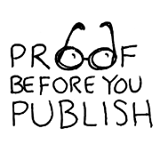Apr 15, 2014 | Tuesday Tips
This tip is a problem I see quite often. Here’s a quick way to know which to use, and when.
Who’s: This is a contraction for who is or who has.
Example: Who’s coming over for dinner?
Whose: This is the possessive case of who or which.
Example: Whose house are we going to for dinner?
Here’s an easy trick: If you were to replace it with who is or who has, would the meaning change? If no, you want who’s. If yes, you want whose.
Apr 8, 2014 | Tuesday Tips
There is always BIG confusion when it comes to these LITTLE words. Here’s a breakdown for you regarding when and how to use them.
TO: in the direction of, toward
TOO: also, in addition
TWO: a pair, the number after one
Apr 1, 2014 | Tuesday Tips |
Here are three general guidelines to help you know whether you should be using one word, or two.
1. Use onto (one word) to mean “on top of,” or “upon.”
2. Use onto (one word) when you mean you are “informed about something,” or “fully aware of something.”
3. Use on to (two words) when on is part of the verb, such as “logging on to a computer.”
Nov 5, 2013 | Tuesday Tips
The first difference between suppose and supposed is that suppose is a verb and supposed is an adjective. Now we can begin to understand the differences in meanings. Here are three examples and an explanation of their meanings.
1) I suppose I should go.
2) I am supposed to go.
3) He is the supposed leader.
In the first example, suppose has a meaning similar to think. Suppose generally expresses a belief that lacks certainty or an opinion.
In the second example, supposed means required or obliged.
In the final example, supposed means either mistakenly believed or based on not very strong evidence.
Oct 22, 2013 | Tuesday Tips
“Could’ve,” “would’ve” and “should’ve” are legitimate verb contractions. When you speak these words, they sound like they end in “of,” but this is just plain wrong. Instead they are the contractions for “could have” “would have” and “should have.”
Oct 15, 2013 | Tuesday Tips
Today’s Tuesday Tip comes straight from Grammar Girl herself at www.quickanddirtytips.com.
“Then” has an element of time. For example, it can mean “next” or “at that time.”
“Than” conveys a comparison.
Quick and Dirty Tip: Both “than” and “comparison” have the letter “a” in them, and “then” and “time” both have the letter “e.”
Check out the entire post, including some examples, by clicking here:
http://www.quickanddirtytips.com/education/grammar/then-versus-than

